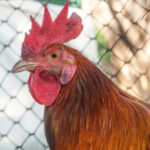Some Chicken Thoughts
 When writing the Caesar Salad recipe last week, I began to discourse on Chicken Caesar. I had got as far as a rant about grilled chicken, then realised I would end up with an article twice the required length. The more I thought about it, the more I thought some chicken musings might be appropriate. Probably quite unnecessary for most of you; however, do remember that any cookery tips I may give are aimed at someone who is at the level I was at about 25 years ago.
When writing the Caesar Salad recipe last week, I began to discourse on Chicken Caesar. I had got as far as a rant about grilled chicken, then realised I would end up with an article twice the required length. The more I thought about it, the more I thought some chicken musings might be appropriate. Probably quite unnecessary for most of you; however, do remember that any cookery tips I may give are aimed at someone who is at the level I was at about 25 years ago.
But first, a little history. Chickens are not native to Britain, or even to Europe. They all evolve from red jungle fowl of South East Asia, first domesticated about 8000 years ago. Via China and India they reached the Mediterranean around 2000 BC. They were brought to Britain by, guess who, the Romans. They are now totally ubiquitous. 50 billion are slaughtered annually; they are the basis of much of the fast food industry; and in 1996, sales of poultry meat overtook beef and veal in Europe for the first time.
If you are of my children's generation or younger, you'll probably be amazed to learn that chicken was once regarded as a luxury food in Britain. Having a chicken at Sunday dinner had as much of a wow factor as a prime roast today. I have a small telly in the kitchen which accompanies the making of routine masterpieces. I saw a snippet of a Dad's Army episode in which Jones had made a delivery of a chicken. The consternation of the platoon was allayed by the explanation that it was the customer's golden wedding.
I've now run a few cookery classes. I like to think my approach to hygiene is sensible without being fanatical, until it comes to chicken, when I become a raging zealot. Cross contamination, undercooking, danger of serious illness and death are all warnings which are issued. Quite right too, but I don't know enough to get involved in the Europe v US debate on chlorine washing. America says it helps remove pathogens: Europe says that just encourages bad rearing practice. Our chickens may be cleaned using only cold air and water. As a result, a trade deal seems a long way away.
Of more concern here are the conditions in which so called battery hens are reared. That's beyond the scope of today's article. Hugh Fearnley-Whittingstall is a tireless campaigner. Read a recent article of his here. My advice to those supermarket shoppers concerned about welfare is to buy the more expensive birds. By and large you get what you pay for.
Sorry, we've come a long way from Chicken Caesar. Put simply, when I read on the menu that mine may be topped with grilled chicken, I tend to run a mile. Why? Well, a few thoughts on ways of cooking chicken, and some problems.
Grilling
For your lovely, well flavoured salad you're looking for something fairly plain, tender and tasting just of chicken. In other words you really don't want strong flavoured marinades, no matter how delicious they may be in another context. The only trouble is that if you stick a chicken breast under a grill or on a hot griddle pan, even if it's beaten thin, by the time it's cooked through it's likely to resemble blotting paper.
Barbecued
Now you're really frightening me. You'll probably put all your chicken bits on at once, won't you? You'll probably add a marinade, won't you? And when that marinade turns black, will you have the faintest clue if your meat is done or not? I suspect that underdone chicken drumsticks may be the biggest cause of food poisoning in the BBQ season.
Frying
Use the phrase fried chicken, and you'll be tempted to put the adjective Southern in front of it. Popular in the southern US originally because of its origins among African slaves. But I made a startling discovery. In his The Encyclopedia (sic) of American Food & Drink, John F Mariani suggests that the Scottish, who enjoyed frying their chickens rather than boiling or baking them as the English did, may have brought the method with them when they settled the [American] South. News to me, and no evidence is produced. All I know is that I don't want deep fried chicken on my Caesar.
Even if it is the form of a delectable schnitzel, flattened, breadcrumbed and shallow fried.
Poached
I would suggest that this is something we don't do nearly often enough. Essentially you are cooking very slowly in poaching liquid. That could be water alone, but if you add plenty of veg you'll have a stock with which to do other things. It's the basis of the celebrated Belgian dish waterzooi. If you do it correctly, you'll have gloriously tender juicy breast meat. Beware - it is possible to overcook, even in liquid. For the chicken breast for your Caesar, though, it's ideal. A breast will need 10 - 12 minutes, depending on size. Not sure if it's done? Well, it's going to be sliced anyway, so take one out and cut into it.
In many cases, however, I suspect that folk just take a few breast slices from a bird whch has been-
Roasted
And from that topic there are many stories. To be continued.